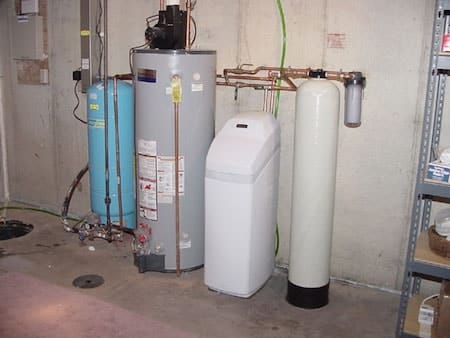Before taking the plunge and buying a water softener for your household, it pays to understand the advantages and disadvantages of using one – because it can sometimes be confusing and even hazardous to health.
Softening water isn’t quite the same as purifying it – so to help you make a decision, look at some of the pros and cons of water softeners:

Water Softener Advantages
1. Appliances last longer
A water softener prevents the build-up of scale deposits which extends the shelf life of household appliances such as coffee makers, washing machines, water heaters, dishwaters, air humidifiers, etc. Not only that, but your repair and maintenance costs go down as a result because the entire plumbing system is protected from this build-up.
2. Lower energy bills
Better heat exchange efficiency in your water heater means you save on your energy bills. For example, if you’re using a gas storage water heater, you can save up to 24.2% over 15 years. Water pumps and other appliances will also use less energy as a result.
3. Easier Cleaning & save on cleaning supplies
It can be quite annoying to work up a lather that just won’t form properly. You end up using way more soap than you need to, because your water is full of hard minerals.
A water softener removes all these hard minerals from your water supply, helping you clean faster and more efficiently. And, you end up saving almost 50% on your washing supplies like soap and detergent.
4. Soft and bright-looking fabric
If you’ve ever dealt with faded and ‘scratchy’ towels, clothes and bed linen, your worries are over with a water softener.
Water Softener Disadvantages
1. Adverse environmental impact
The wastewater that’s discharged into your sewer can not only increase your sewage bill but also add up to several thousand gallons in just one year, especially in areas where the water supply has a lot of hard water.
Furthermore, depending on where you live, the excess salt and chloride can often end up in lakes, threatening local aquatic life and freshwater fish.
2. Not suitable for drinking
Drinking softened water or using it for cooking will inevitably increase your daily sodium and potassium intake. These two minerals play a contributing role in high blood pressure, hypertension and other life-threatening diseases – softened water can increase the risk of certain health conditions in those predisposed to it.
3. Complex and expensive installation
A whole-house softening system will always need to be ‘plumbed in’. This is costly and time-consuming, making it a particularly less than ideal option for those living on rent. The only exception here may be electronic descalers that can clip or wrap around the main supply line. By the time it’s installed you can expect to pay between $400 and $4,000.
4. Corrosion
Softened water is also more acidic which means it can be corrosive. This, unfortunately, can dissolve heavy metals out of pipes, including solders and plumping fixtures, to the extent that they can create not just aesthetic but health problems as well.
- Tulip Mania – The Story of One of History’s Worst Financial Bubbles - May 15, 2022
- The True Story of Rapunzel - February 22, 2022
- The Blue Fugates: A Kentucky Family Born with Blue Skin - August 17, 2021